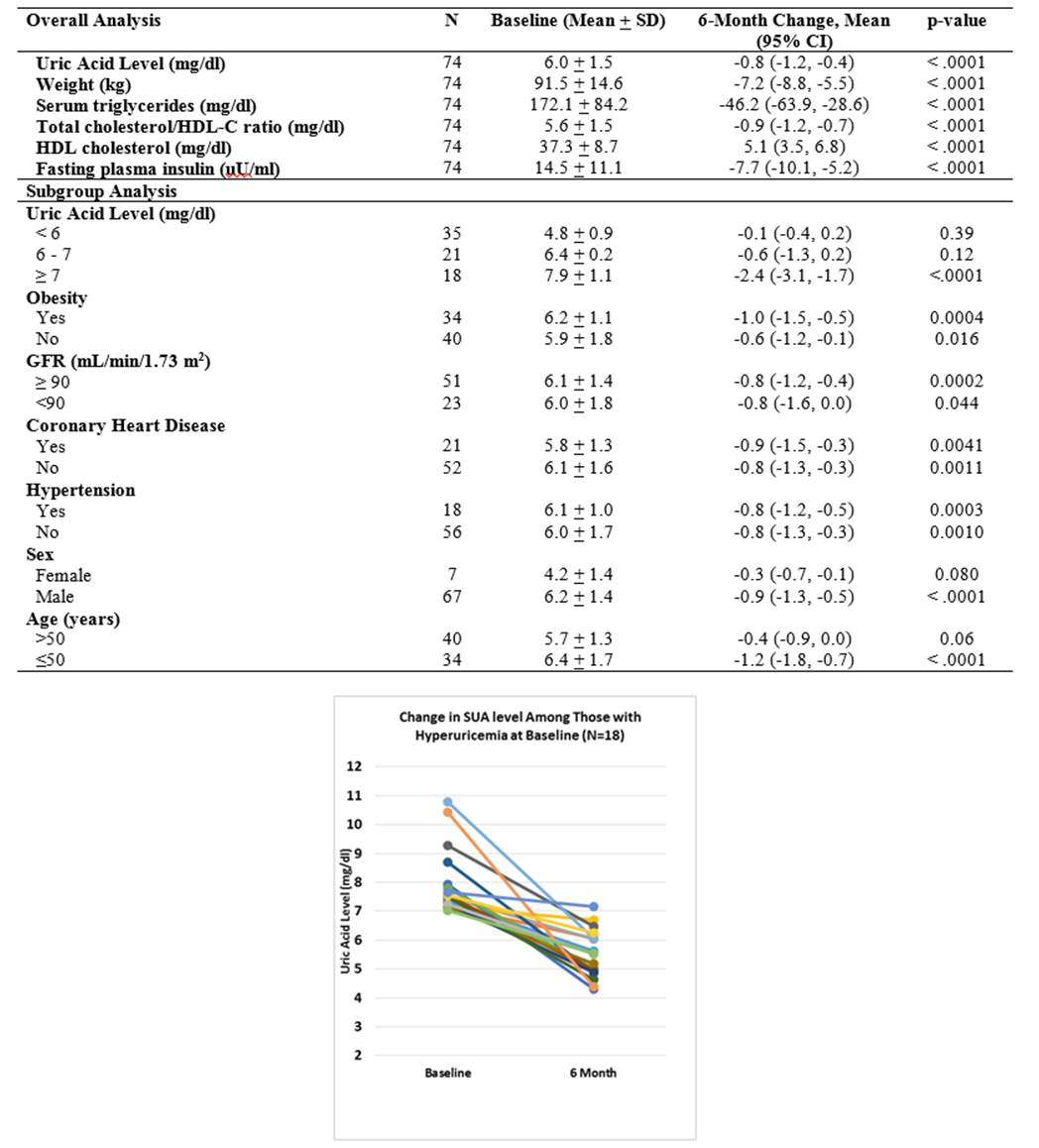Session Information
Session Type: Abstract Submissions (ACR)
Background/Purpose The conventional low-purine dietary approach to gout offers limited efficacy, palatability, and sustainability, and promotes increased consumption of refined carbohydrates and saturated fat that can actually worsen gout’s cardiovascular (CV)-metabolic comorbidities. In contrast, effective dietary approaches to reduce CV-metabolic conditions (including obesity) could also lower serum uric acid (SUA) levels by lowering adiposity and insulin resistance. Similarly, high-protein, low-carbohydrate diets such as the Atkins diet may lower SUA despite substantial purine loading and ketogenesis. Indeed, a small study (n=13) that employed a high-protein diet with reduced calories found that mean SUA levels decreased from 9.6 to 7.9 mg/dL, with reduced gout attacks over 16 weeks (Ann Rheum Dis 2000). Additional benefits included an improved lipid profile. We investigated the SUA response to the Atkins diet among overweight or obese individuals over a 6 month period.
Methods Our study population was derived from the Dietary Intervention Randomized Controlled Trial (DIRECT) of overweight or obese participants (BMI ≥ 27). The Atkins diet (i.e., high protein, low-carbohydrate, no calorie restriction) was one of DIRECT’s intervention groups and was a focus of the current analysis. We used serum samples at -80°C to compare SUA levels at baseline and 6 months among 74 participants with complete datasets and analyzed the SUA level response as well as lipid profile, weight change, fasting insulin levels, and glucose levels.
Results The mean age was 51 years and the mean BMI was 31. Most participants (91%) were men. The overall rate of adherence to the diets in DIRECT was > 95% during our 6-month study period. Baseline SUA level was 6.0 mg/dL and the overall SUA change at 6 months was -0.8 mg/dL. This change varied substantially according to baseline characteristics (Table), particularly baseline SUA levels. Individuals (N=18) with SUA levels > 7mg/dL (above the saturation point) showed a decrease in mean SUA levels from 7.9 to 5.5 mg/dL (p <.0001). Of the 18, 11 (61%) reached SUA < 6mg/dL (the usual anti-gout SUA therapeutic target) and 6 (33%) reached SUA level < 5mg/dL (the SUA therapeutic target for advanced gout) (Figure). Those with obesity and younger individuals (<50 years) tended to have a larger SUA decline. Additional benefits included significant improvements in HDL-cholesterol, total cholesterol/HDL-C ratio, triglyceride levels, and fasting insulin levels (p <.0001).
Conclusion Our findings suggest that the Atkins diet (i.e., a high protein diet without calorie restriction) can reduce SUA levels despite substantial purine loading. This effect may be more pronounced and clinically meaningful among those with hyperuricemia or obesity. Comparative effectiveness research with other proven CV-metabolic diets would help determine the optimal dietary approach to lower SUA levels.
Disclosure:
N. Lu,
None;
I. Shai,
None;
Y. Zhang,
None;
G. Curhan,
None;
H. K. Choi,
Takeda,
5,
AstraZeneca,
5.
« Back to 2014 ACR/ARHP Annual Meeting
ACR Meeting Abstracts - https://acrabstracts.org/abstract/high-protein-diet-atkins-diet-and-uric-acid-response/

